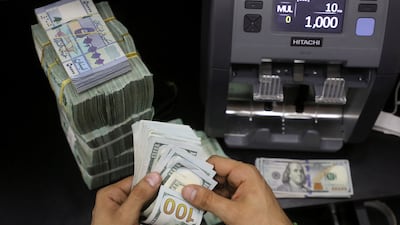Inflation in Lebanon hit an annual 230 per cent in August, amid stalled economic reforms and a political vacuum that has left the country without a president for nearly a year.
Triple-digit inflation continued for the 38th consecutive month as the country's currency continued to lose value on the parallel and official markets since it was devalued by 90 per cent at the start of February.
The increase in the cost of living last month was led by the soaring cost of housing, water, electricity, gas and other fuels, as well as a surge in the price of food, non-alcoholic beverages and transport, the Central Administration of Statistics' Consumer Price Index showed.
The CPI increased by about 1 per cent from July 2023.
Food prices, which account for 20 per cent of the consumer price index, soared an annual 274 per cent while housing, water, electricity, gas and other fuels – which have a 28 per cent weighting – were up 233 per cent.
Health costs, which represent about 8 per cent of the index, surged 235 per cent and transport, which has a 13 per cent weighting, increased 231 per cent.
Lebanon's inflation rate began to decline after hitting 171 per cent last year, the highest in about four decades, and 155 per cent in 2021.
However, it started to pick up early this year as the country's central bank devalued the Lebanese pound in February.
The official exchange rate changed to 15,000 pounds to the US dollar, compared with the peg in place since 1997 of 1,507.50 to the greenback.
Last month, business conditions in Lebanon’s private sector fell to a seven-month low after they hit a 10-year high in July, as output and new orders declined.
Lebanon's Blom purchasing managers’ index, a measure of the strength of the country’s private sector economy, fell to 48.7 in August from 50.3 in July, marking the fastest contraction in six months, dragged down by challenging domestic conditions that dented output volumes.
Since 2019, the country has been in the grip of an economic crisis described by the World Bank as one of the worst in modern history.
It has yet to enforce critical structural and financial reforms required to unlock $3 billion of assistance from the International Monetary Fund, which could also pave the way for billions more in aid from other international donors.
Earlier this month, the IMF warned that the lack of political will to introduce critical reforms has eroded public services, accelerated the deterioration of the country's infrastructure, worsened poverty – which will weigh on its economy for years to come.
In June, the IMF warned that further delay of reforms would keep confidence low while cash dollarisation of the economy would increase, causing the national currency to depreciate even further and keeping inflation high.
Lebanon's economy contracted by about 58 per cent between 2019 and 2021, with gross domestic product falling to $21.8 billion in 2021 from about $52 billion in 2019, according to the World Bank. It was the largest contraction on a list of 193 countries.
The World Bank estimates that real gross domestic product declined by 2.6 per cent in 2022 and is projected to contract 0.5 per cent this year.
Lebanon's economy collapsed after it defaulted on about $31 billion of Eurobonds in March 2020, and its banking sector is estimated to have recorded more than $70 billion in losses.
The country has also been without a president since the end of October 2022, when the six-year term of Michel Aoun ended. It is being run by a caretaker cabinet led by Prime Minister Najib Mikati, with limited powers.
The election of a president requires the consensus of the country's political elite.
Political vacuums have stalled Lebanon's economic progress as they scuttle the enactment of reforms deemed necessary for the nation to emerge from its worst financial crisis.
The country was previously without a president for two and a half years until Mr Aoun's election by the 128-seat parliament in 2016.
His predecessor, Michel Sleiman, was elected in 2008 with the help of Qatar and after 19 postponements in parliament, ending an 18-month political crisis.


